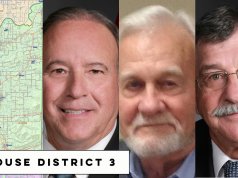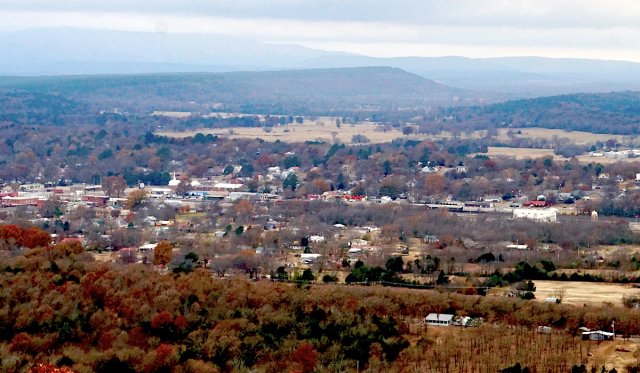
HEAVENER — Over the past decade, many residents of this small LeFlore County community have stopped drinking the city’s tap water, a sign of trouble for a town whose leaders are grappling with contractual agreements, state fines and a powerful multinational corporation.
Recently, the Heavener City Council voted to terminate its contract with Veolia North America, the largest third-party contractor for water treatment and wastewater management in the United States. Heavener had been paying Veolia $200,000 per month to manage its water treatment plant, which was found to have nine primary violations that could affect human health in an August assessment by the Oklahoma Department of Environmental Quality.
“The first thing you tell a person when they move to town is, ‘Don’t drink the water,’” Heavener resident Brenda Jackson said prior to the council’s Nov. 21 vote. “We’re a small town with big-city water problems.”
Those water problems are naturally episodic, as a water treatment plant’s job is to assess and address source-water fluctuations. In Heavener — population 3,500 — the primary water source is the Poteau River, which has solute variation based on time of year, rainfall amounts and other factors like pollution. It is standard procedure for a water treatment plant to adjust its filtration and application of chemicals as quickly as source water quality changes.
Public documents and interviews with area residents indicate the Heavener Water Treatment Facility — managed for the majority of three decades by Veolia North America — has not maintained industry and government standards.
‘They don’t know what they’re doing’
In the spring of 2019, frustrated Heavener families found the ear of newly-elected Oklahoma Rep. Lundy Kiger (R-Poteau), a former vice president of the nearby AES Shady Point power plant. Having also served as the plant’s environmental manager and its director of community and government relations, it was not the first time Kiger had heard of issues with Heavener tap water.
Twenty five years earlier while working for AES Shady Point, Kiger received a request from Heavener’s then-city manager: Would the power plant’s water treatment team help find solutions for Heavener’s troubled water treatment plant?
“I started getting calls about this late April and early May, talking to people and looking at the water samples,” Kiger said. “It was the exact same thing from 25 years earlier.”
With pungent brown and black water sometimes flowing from Heavener’s taps, the Oklahoma Department of Environmental Quality traced the issues back to the water treatment plant. The agency’s August report (embedded below) diagrams the Heavener water treatment system and cited process or personnel deficiencies in nearly every stage.
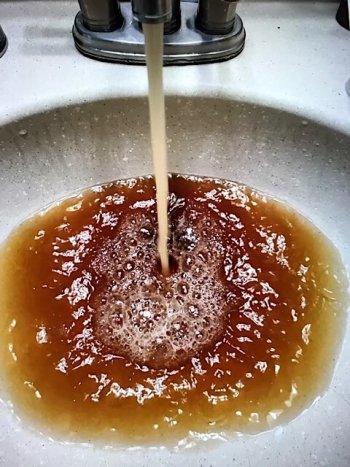
“Each treatment process represents a barrier to prevent the passage and survival of cysts and other microorganisms through the plant into the water supplied to the public,” the report states.
Veolia project manager Tim Dewitt, who has been with the company since 2010, declined to comment Nov. 21 when asked about issues relating to Heavener’s water. He directed all inquiries to Veolia North American headquarters in Boston.
But Dewitt did distribute a letter to the editor of a local newspaper Aug. 26 alleging that Kiger was drawing attention to the water quality issues for political gain.
“The water we treat has always met and exceeded the primary standards for quality as determined by the state Department of Environmental Quality and the Safe Drinking Water Act,” Dewitt wrote.
But the “primary standards” Dewitt said have always been met were the same ones deemed deficient two days later during a DEQ inspection.
Dewitt’s letter also claimed Heavener residents are “receiving the very best service possible in our water plant operations” and that the “clear cause of the problem is the age of the network of the pipes that run outside of the plant which are, notably, not within the scope of Veolia’s plant operations.”
Distribution system maintenance is the responsibility of the Heavener Utility Authority, which invested $3 million in 2007 to address aging pipes, according to Heavener City Manager Cody Smith.
“If I had a dollar for every time we were told, ‘It’s the pipes, stupid,’ we would all be retired,” said Heavener resident Peggy Persons.
Persons expressed her frustration with the City of Heavener, whose stance on the water she summarized sarcastically: “Veolia says it’s OK, so it has to be OK.”
In response to Veolia blaming city pipes, Kiger organized a presentation to the Heavener City Council over the summer of 2019 from competing water treatment servicers.
“Old pipes do not cause black water,” Kiger said, raising his voice and criticizing Veolia. “The people they have working for them are just incompetent. They don’t know what they’re doing.”
Multiple employees of Veolia in Boston said they would answer questions about the Heavener situation, but director of corporate communications Donna Ayer ultimately directed NonDoc to existing public statements.
Ayer was sent multiple questions concerning Veolia’s operation of the Heavener Water Treatment Facility, but she did not provide answers.
‘We definitely don’t cook or drink with it’
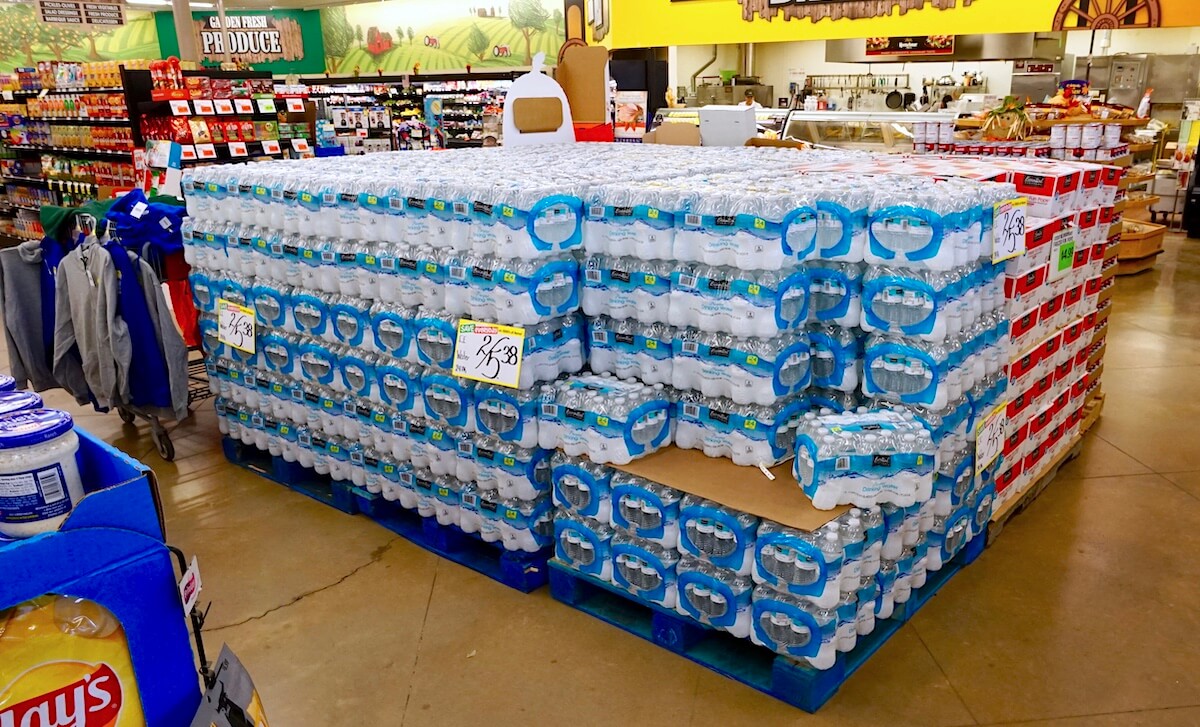
About 10 miles from the Arkansas border at the CV’s Savers Club grocery store, the first thing customers notice are several pallets of bottled water on sale where one might normally find seasonal displays. Assistant manager Rosa Radiach said she has to keep at least two pallets of bottled water on display and six to eight additional pallets in storage at all times.
“It’s bad enough we have to shower with (city water), but we definitely don’t cook or drink with it,” Radiach said.
On Thursday, Nov. 21, nearly a dozen Heavener residents told NonDoc their families use two to three cases of bottled water per week for all cooking and drinking needs. Even if everyone in the 3,500-person town limited themselves to one bottle of water per day, that would still mean the community uses more than 1 million bottles annually. Heavener does not have a recycling program to capture the plastic after each use.
Residents said the city has instructed those experiencing discolored water to flush their faucets for 15 minutes before use, which has led some families to receive water bills averaging $100 to 150 per month.
“If you’ve got over 3,500 residents flushing for 15 minutes, you get the meter spinning. The sewer bill goes up at the same time,” Kiger said. “Some people don’t make enough to live on, then to try and pay those bills, and on top of that, they can’t even use the water. They’ve got to go buy bottled (water).”
Tonya Gore, a Heavener resident and parent, said she worries about those who cannot afford to purchase packaged water.
“There are several fixed-income families [whose] food stamps don’t give them enough money to buy bottled water,” Gore said. “It just keeps getting worse and worse and worse.”
Gore said she brought the issue up with city leaders but was told she needed to flush her taps longer to get clear water.
“I told them, I’ve got four people living in my home, and you’re telling me I’m not washing enough clothing, cleaning enough dishes, taking enough showers a day to keep the pipes clean running to my home?” Gore recalled. “We use [bottled water] to cook with, we brush our teeth with it. Unfortunately, I can’t bathe in it because I’m not rich enough.”
Asked about recommendations that individual residents flush their taps, Smith — the Heavener city manager — stuck to a simple statement.
“Flushing is an integral part of a water distribution system and is done in a systematic approach,” Smith said.
But Heavener’s water quality has been an issue for so long that residents say it has depressed the town’s real estate values.
“When people are selling houses in the Heavener area, they put in big capital letters, ‘NOT ON HEAVENER WATER,'” said Persons, who often discusses the water situation on social media with Gore and Kiger.
Thirty-year Heavener resident Debra McClain listed her home for sale in 2019 and said she has not received a single offer.
“When they find out the home is in Heavener, they’re not interested in it,” McClain said. “You could never get the true value of your home here.”
Heavener resident and new mother Bethany Meeks said she worries about her children’s health when she has to bathe them using brown water. She said she has gone as far as exploring the option of drilling a well on her property, but she learned that would be prohibited within Heavener city limits. As a result, she said using the city’s water has damaged components of her home.
“We don’t have water going to our fridge. We’ve replaced all of the faucets in our house,” Meeks said. “We’ve replaced our toilets twice, my dishwasher twice and my hot water heater. My home was built in 2009.”
‘They don’t even know what the alarms mean’
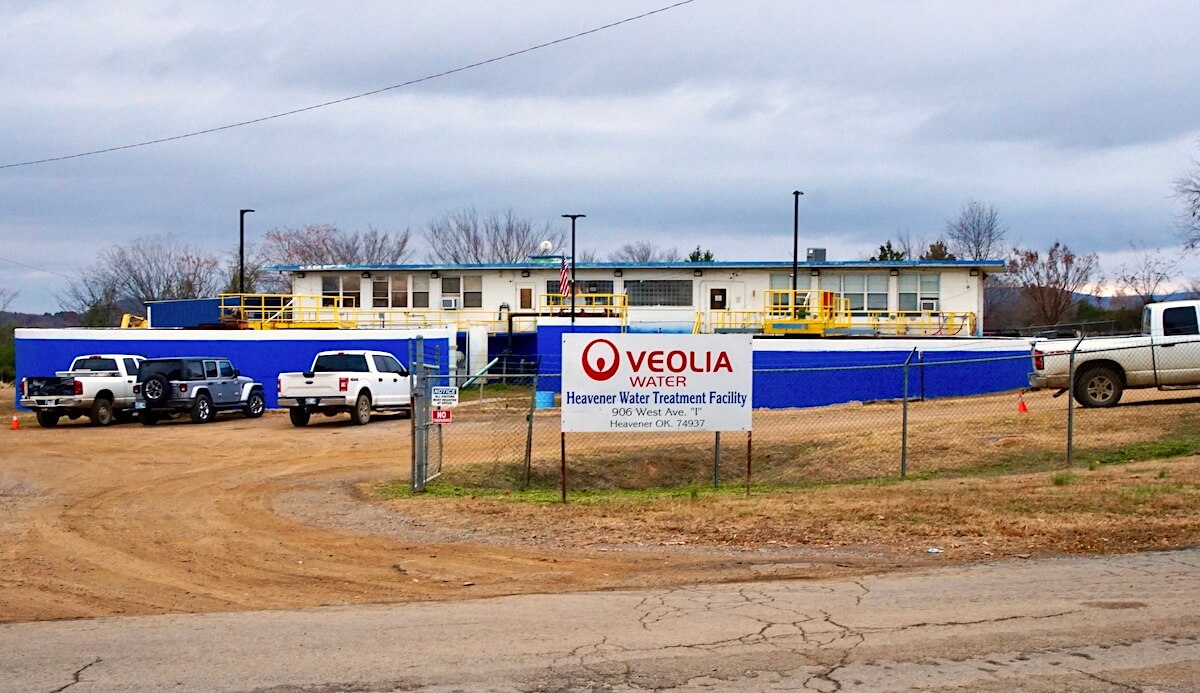
Citizen complaints like those above ultimately led to a DEQ inspection of the Heavener Water Treatment Facility on Aug. 28. The agency’s assessment (embedded below) was highly critical of the methods and operations of the plant.
Kiger said DEQ’s findings showed “total negligence and a lack of leadership” from Veolia.
“When you read the report, they’ve got water coming in, they’ve got no idea what the quality is, they’ve got no idea what the quantity is,” Kiger said. “They have no measuring devices to put chemicals in. They don’t even know what the alarms mean or what the parameters are for what the equipment is measuring.”
Those factors are integral for adjusting plant operations to match changing raw water quality and consumer demand, according to the DEQ report, which stands in stark contrast to Dewitt’s Aug. 26 assertion that Veolia was delivering “clean, compliant, and reliable water to people and businesses” of Heavener.
In their report, DEQ engineers drilled down on three basic areas: filtration, chemical treatment additions and monitoring equipment operations.
Filtration findings included:
- Methods used to clean water filters differed among plant employees;
- Vegetation had been allowed to grow into a storage lagoon that limited capacity to clean the treatment plant’s filters;
- After cleaning, the filters were not being measured to ensure appropriate effectiveness.
In addition to filtration, the water treatment process involves chemical additions to remove iron and manganese (which discolor the water) and ensure a proper pH to prevent corrosion of pipes throughout the distribution system. According to their report, DEQ staff discovered that plant operators had been using an incorrect equation to calculate what quantities of chemicals were needed.
“The chemical feed equation for the orthophosphate was used for calculating the potassium permanganate feed rate,” the DEQ report stated.
Heavener residents have sometimes reported water with a purple hue that stings the skin coming out of their faucets. Potassium permanganate is a purple compound.
In their report, DEQ staff suggested a more neutral pH to prevent damage to the city’s water distribution system, which they said already has the highest per-capita water loss in the state. A series of water main breaks in 2019 exacerbated public frustration in Heavener, and residents have debated and speculated about the cause of the main breaks.
Per DEQ’s recommendation, keeping the water at a neutral pH could prevent corrosion and breakage of the pipes in the distribution system. Corroded pipes can throw off flecks of metal as water flows through them, something residents have reported seeing after filling glasses with tap water.
When DEQ inspectors tested the chlorine content of Heavener’s water on its way to residents’ homes, they found little to no chlorine, which is necessary to keep microbes from growing. Low amounts of chlorine can be especially dangerous when water turbidity is high. The particulates that block light from passing through the water also effectively shield microbes from chlorine making the microbes more likely to survive in the water system.
“You have to have a certain amount of chlorine at the furthest point that the water travels,” Kiger said. “They were checking at the middle point and finding little to no chlorine whatsoever.”
DEQ inspectors also found that, at multiple points where water should be collected for monitoring, Veolia workers either did not have an access point in the system to draw samples or were getting samples from a part of the system that would give artificially positive information about water quality. Furthermore, DEQ staff wrote that critical measurement equipment was not being calibrated accurately.
When DEQ tested the water with its own equipment, staff wrote that they found instances where turbidity levels (murkiness) were between two and five times what the uncalibrated equipment was reading. Seasonal fluctuations in the Poteau River’s water quality must be accounted for at Heavener’s water treatment plant, and the equipment used to measure turbidity is crucial to that process.
“It’s not rocket science,” Kiger said. “It’s a process that takes qualified people, and the company of Veolia does not care. They do not care at all.”
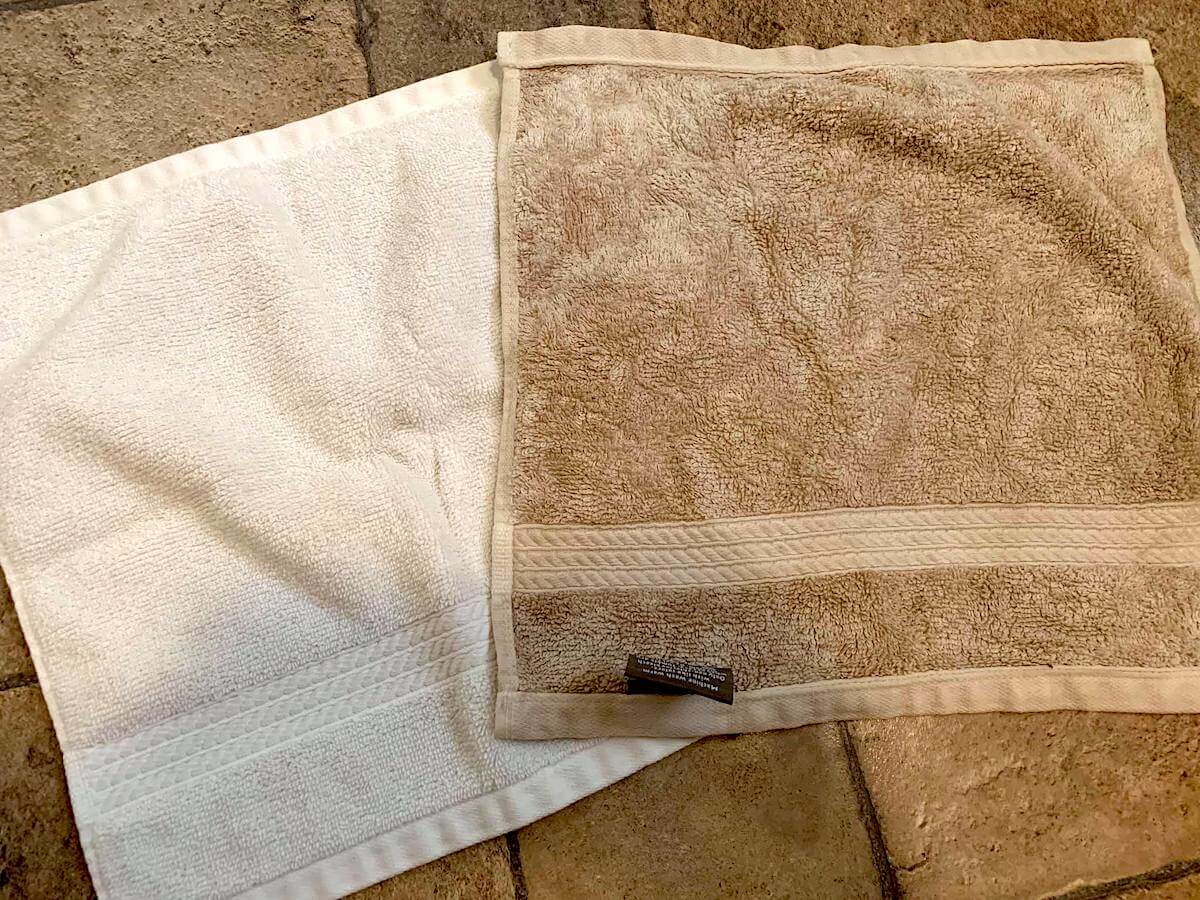
Water problems lead to $3 million DEQ fine
After a month of Veolia working to become compliant, DEQ handed down a fine of more than $3 million on Oct. 21.
DEQ communications director Erin Hatfield declined to comment on the seriousness of infractions cited against Veolia and the Heavener Utility Authority.
“The DEQ takes all issues of noncompliance very seriously,” Hatfield said. “(It) was unusual for the DEQ to fine entities that amount of money.”
Hatfield said the fine was calculated by multiplying the maximum allowable daily fine of $10,000 by the 303 days Veolia’s operation of the Heavener facility was deemed noncompliant.
In response, Crowe & Dunlevy attorneys representing Veolia sent letters to the HUA demanding that Heavener take responsibility for the DEQ’s citations and fines. They argue the city is contractually obligated to pay the state agency.
At the Nov. 21 Heavener Utility Authority meeting, members spent more than two hours discussing the Crowe & Dunlevy letter and how to respond. The contract between Heavener and Veolia stipulated that the HUA would be responsible for any regulatory or enforcement agency fines incurred for reasons other than operator negligence. However, HUA members noted that the contract also stipulated Veolia would supply a sufficient number of qualified and capable persons to operate the water treatment plant and that a $3 million fine levied on Veolia and not Heavener was evidence that the company had indeed been negligent.
As HUA members debated whether to terminate their contract with Veolia, some expressed trepidation about angering the company that was responsible for their water.
“Who wants to drink Veolia water now?” HUA member Marvin Merideth asked. “They weren’t willing to make good water when things were good. Now that things are bad, what will they do?”
Kiger argued for members to terminate their contract with Veolia.
“You hired Veolia to make potable water. They did not do that,” Kiger said.
Authority member Gale Nichols asked Kiger if mediation could resolve the conflict and cause DEQ to drop the fine.
“We would like to resolve this without bankrupting the HUA,” Nichols said.
Kiger pushed back.
“If you don’t remove Veolia, you’re not taking the position that they were wrong,” Kiger said. “They are the only ones in the county that don’t think they’ve messed up. Look, they’re a large company. They’re going to litigate you, even if they are wrong.”
Ultimately, the HUA voted 6-0 to terminate its relationship with Veolia for breach of contract. Nichols abstained from voting. As a result, Veolia relinquished operations of the Heavener Water Treatment Facility on Dec. 31.
Wednesday, U.S. Water Services Corporation officially took over operation of the Heavener Water Treatment Facility, according to Kiger. In a Dec. 19 Facebook post, he praised the Heavener City Council for selecting a new service provider.
“Congratulations to each of you and thank you to the members of the HUA who said enough is enough and stood with the people of Heavener to vote Veolia out of town,” Kiger wrote. “The future of Heavener is now brighter than ever.”
Veolia: HUA ‘must accept responsibility’ for water problems
Four days after the Nov. 21 vote, Veolia North America Vice President of Communications Carrie Griffiths released a statement lamenting Heavener’s decision to terminate their contract.
“The fact remains that Veolia assumed operations of the water plant less than a year ago at a time when the (Heavener Utility) Authority clearly needed help due to numerous operational challenges, especially a damaged computer monitoring system,” Griffiths wrote. “Veolia agreed to step in and help the Authority but, as the Authority clearly knows, Veolia’s willingness to assist was conditioned upon the parties’ including a provision in the contract that made it clear that Veolia would not be held liable for compliance or regulatory problems that were likely to arise due to the preexisting condition of the water plant. The Authority agreed to those terms. Based on those facts, it is clear why the Authority must accept responsibility for the violations and fine issued by the DEQ.”
It is true that Veolia has only been under contract with Heavener since 2018. However, Veolia was responsible for the plant’s operation from the 1990s until 2015.
In 2015, then-Veolia employee Dewitt began managing the plant independently for the HUA and continued to manage the plant when Veolia was reinstated as the water treatment operator in 2018. Veolia did not respond to questions about Dewitt’s employment history or their relationship with Heavener prior to 2015.
Veolia’s denial of responsibility has been poorly received by Heavener residents.
“They’re attacking our city,” Persons said. “Well, we’ve gotten so accustomed to it that it’s scary. It’s like we’re kind of numb to it. It’s bad that we let that happen.”
Hatfield, the DEQ spokeswoman, said she could not comment on why the DEQ had fined Veolia instead of the City of Heavener, but she was able to confirm that the DEQ regularly fines municipalities for violations of drinking water standards and that this is the first fine Veolia has received in Oklahoma.
Nursing home manager: ‘We have good water, no problems’
NonDoc received multiple suggestions that Heavener’s water problems were having an impact on the town’s nursing home. Persons, Meeks, and Gore each said they had heard of the nursing home losing large amounts of linens and resident clothing owing to tainted water.
Kiger said that, during his summer town halls, nursing home employees voiced concerns about linen and food preparation problems when water quality would dip or service was cut off.
Heavener Nursing & Rehab manager Mitchell Townsend, however, said there were no reports of water problems other than water main breaks that the city had been fixing over the summer.
“We have good water, no problems,” Townsend said. “The water looks good, tastes good, sparkles, cleans their clothes, and we drink the water with all the residents.”
The 2018 and 2019 annual recertification surveys conducted by the Oklahoma State Department of Health make no mention of water quality at the Heavener Nursing & Rehab facility, although the home was cited for and required to correct deficiencies related to food safety, kitchen sanitation and various patient-care issues in both years.
Townsend’s statements about the town’s tap water stand in contrast to other Heavener residents’ claims, as many people asked about the situation confirmed they have experienced brown water, use bottled water whenever possible or have experienced an economic hardship related to water problems. Those included in this story agreed to speak on the record, but many others declined.
Kiger said getting people to tell the truth has been difficult. He said some would thank him at lunch for his efforts to draw attention to the water problems, only to give contradictory statements at town halls held later in the evening.
“What got my attention initially was the hard pushback. (City officials would claim) we don’t have a problem, we don’t have a problem,” Kiger said. “It has taken time to get people brave enough to step up and say, ‘We’re tired of this.’”
Hatfield said any Oklahoma citizen concerned about his or her water quality should report it to the DEQ.
“If people are aware or believe there may be issues, they are absolutely encouraged to contact the DEQ through our hotline which is available 24 hours a day, 7 days a week,” Hatfield said. “It can be anonymous or confidential, and that number is 800-522-0206. Or they can also submit those complaints online at our website which is deq.ok.gov. We are required to send someone out once a complaint is received to investigate the situation.”
DEQ assessment of the Heavener Water Treatment Facility
https://nondoc.com/wp-content/uploads/2020/01/Heavener-WTP-Assessment-Final-Report.pdf” height=”450px” download=”all”]












